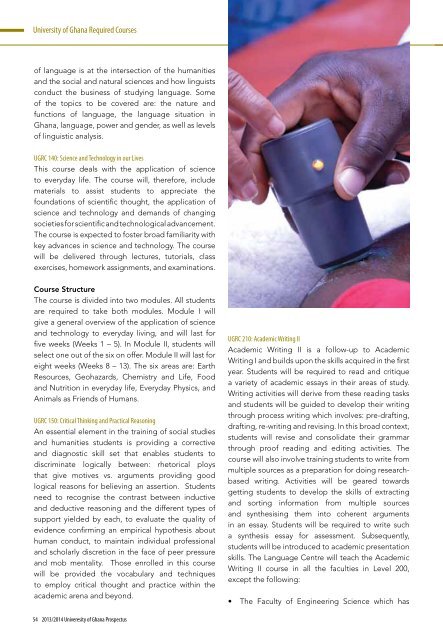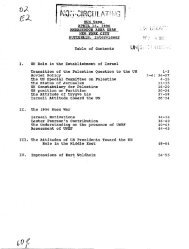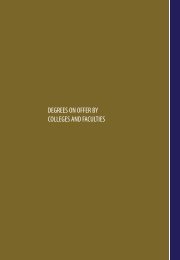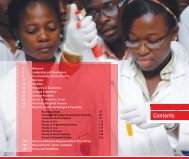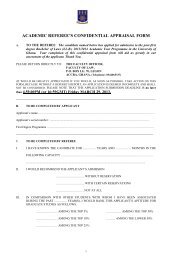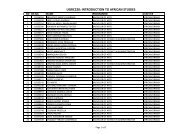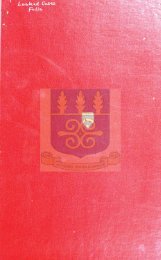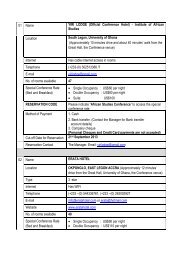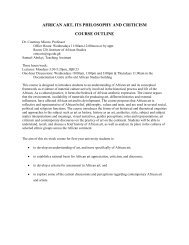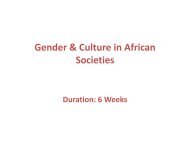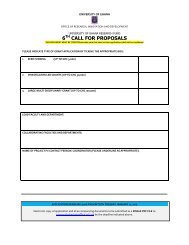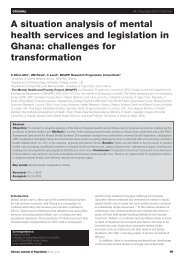General Pages - University of Ghana
General Pages - University of Ghana
General Pages - University of Ghana
You also want an ePaper? Increase the reach of your titles
YUMPU automatically turns print PDFs into web optimized ePapers that Google loves.
<strong>University</strong> <strong>of</strong> <strong>Ghana</strong> Required Courses<br />
<strong>of</strong> language is at the intersection <strong>of</strong> the humanities<br />
and the social and natural sciences and how linguists<br />
conduct the business <strong>of</strong> studying language. Some<br />
<strong>of</strong> the topics to be covered are: the nature and<br />
functions <strong>of</strong> language, the language situation in<br />
<strong>Ghana</strong>, language, power and gender, as well as levels<br />
<strong>of</strong> linguistic analysis.<br />
UGRC 140: Science and Technology in our Lives<br />
This course deals with the application <strong>of</strong> science<br />
to everyday life. The course will, therefore, include<br />
materials to assist students to appreciate the<br />
foundations <strong>of</strong> scientific thought, the application <strong>of</strong><br />
science and technology and demands <strong>of</strong> changing<br />
societies for scientific and technological advancement.<br />
The course is expected to foster broad familiarity with<br />
key advances in science and technology. The course<br />
will be delivered through lectures, tutorials, class<br />
exercises, homework assignments, and examinations.<br />
Course Structure<br />
The course is divided into two modules. All students<br />
are required to take both modules. Module I will<br />
give a general overview <strong>of</strong> the application <strong>of</strong> science<br />
and technology to everyday living, and will last for<br />
five weeks (Weeks 1 – 5). In Module II, students will<br />
select one out <strong>of</strong> the six on <strong>of</strong>fer. Module II will last for<br />
eight weeks (Weeks 8 – 13). The six areas are: Earth<br />
Resources, Geohazards, Chemistry and Life, Food<br />
and Nutrition in everyday life, Everyday Physics, and<br />
Animals as Friends <strong>of</strong> Humans.<br />
UGRC 150: Critical Thinking and Practical Reasoning<br />
An essential element in the training <strong>of</strong> social studies<br />
and humanities students is providing a corrective<br />
and diagnostic skill set that enables students to<br />
discriminate logically between: rhetorical ploys<br />
that give motives vs. arguments providing good<br />
logical reasons for believing an assertion. Students<br />
need to recognise the contrast between inductive<br />
and deductive reasoning and the different types <strong>of</strong><br />
support yielded by each, to evaluate the quality <strong>of</strong><br />
evidence confirming an empirical hypothesis about<br />
human conduct, to maintain individual pr<strong>of</strong>essional<br />
and scholarly discretion in the face <strong>of</strong> peer pressure<br />
and mob mentality. Those enrolled in this course<br />
will be provided the vocabulary and techniques<br />
to employ critical thought and practice within the<br />
academic arena and beyond.<br />
UGRC 210: Academic Writing II<br />
Academic Writing II is a follow-up to Academic<br />
Writing I and builds upon the skills acquired in the first<br />
year. Students will be required to read and critique<br />
a variety <strong>of</strong> academic essays in their areas <strong>of</strong> study.<br />
Writing activities will derive from these reading tasks<br />
and students will be guided to develop their writing<br />
through process writing which involves: pre-drafting,<br />
drafting, re-writing and revising. In this broad context,<br />
students will revise and consolidate their grammar<br />
through pro<strong>of</strong> reading and editing activities. The<br />
course will also involve training students to write from<br />
multiple sources as a preparation for doing researchbased<br />
writing. Activities will be geared towards<br />
getting students to develop the skills <strong>of</strong> extracting<br />
and sorting information from multiple sources<br />
and synthesising them into coherent arguments<br />
in an essay. Students will be required to write such<br />
a synthesis essay for assessment. Subsequently,<br />
students will be introduced to academic presentation<br />
skills. The Language Centre will teach the Academic<br />
Writing II course in all the faculties in Level 200,<br />
except the following:<br />
• The Faculty <strong>of</strong> Engineering Science which has<br />
54 2013/2014 Univeresity <strong>of</strong> <strong>Ghana</strong> Prospectus


